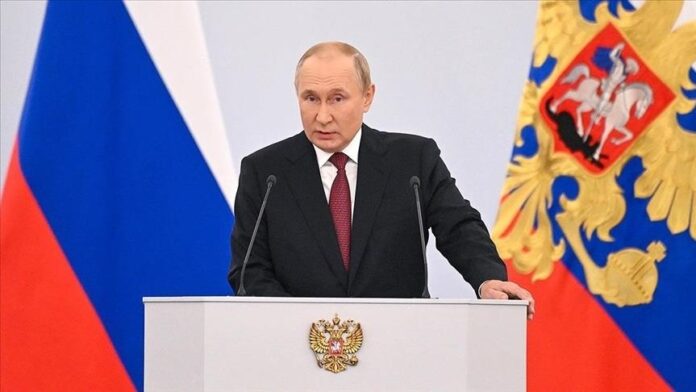MOSCOW, Russia – Russian President Vladimir Putin has pledged to provide free grain supplies to six African countries, while noting that Moscow would not rejoin the Black Sea Grain Initiative, despite pleas from the African Union.
Speaking at the Russia-Africa summit held in St. Petersburg on 27 July, which is being attended by delegations from 49 different African countries, Putin stated that Russia had the ability to “fill in the gap left by the withdrawal of the Ukrainian grain from the global market, either by selling its grain or by transferring it for free to the neediest countries in Africa.”
“To be more specific, let me say that in the next few months, next three to four months, we will be ready to provide, free of charge, a supply of 25,000-50,000 tonnes of grain each to Burkina Faso, Zimbabwe, Mali, Somalia, the Central African Republic and Eritrea, delivered at no cost,” Putin stated, at the plenary session of the Forum.
Russia’s move aims to capitalise on the food crisis in Africa and bolster its standing as a key player on the continent, despite Western sanctions and widespread criticism regarding its involvement in the war in Ukraine.
Putin attributed the decision to withdraw from the Black Sea grain deal partly to Western sanctions, which he said had hindered the sale of Russian agricultural products internationally. The deal, brokered by Turkey and operational for a year, facilitated the safe transit of billions of dollars worth of grain from Ukraine through the Black Sea. Now, as Russia aims to directly supply grain to Africa, concerns arise about the potential impact on Ukraine’s position in the global grain market.
“Nothing of what was agreed upon or what we were promised materialised,” he said, when explaining why Russia would no longer take part in the Black Sea Grain Initiative. “None of the conditions related to lifting the sanctions against the exports of Russian grain and fertilisers to the global markets have been fulfilled. Not a single one of them. We even faced obstacles when trying to deliver mineral fertilisers to the poorest countries that need them for free.”
Speaking in response to Putin’s promise, UN Secretary-General António Guterres responded sceptically, suggesting that the free grain provided would not be enough.
“It is clear that when taking out of the market millions and millions of tonnes of grains … [this] will lead to higher prices,” Guterres told reporters. “So it’s not with a handful of donations to some countries that we correct this dramatic impact that affects everybody, everywhere.”
Russia also aimed to gain African leaders’ support by claiming that the Black Sea deal had set a preference for “well-fed European markets” over African nations.
Earlier on 27 July, the African Union called on Moscow to restore the Black Sea grain deal, seen by many as essential amidst the ongoing war that has disrupted Black Sea shipping routes and to prevent shortages.
“The consequences affect the whole world and especially Africa,” Comoros President Azali Assoumani, the current head of the African Union, told Russian state media. “So yes, we have to make addressing this issue a priority. In fact, everything is a priority. If they put the guns down there, there will be no problem. Until that happens, I think the issue of grains and fertilisers concerns everybody. We will talk about it in St Petersburg, we will discuss it with Putin to see how we can restart this agreement.”
By bne IntelliNews





